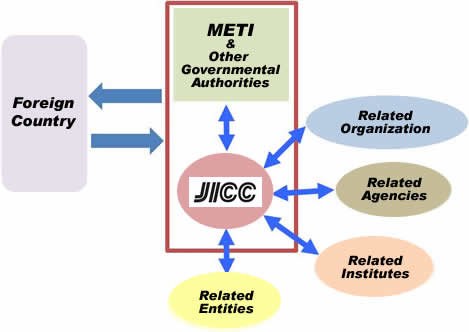What is JICC ?
1DEstablishment of JICC
It is widely recognized that climate change and energy security are the most important challenges to be overcome in the strategic diversification of energy resources.
A growing number of countries have expressed their interest in introducing nuclear power generation and been planning or considering new construction of nuclear power plants, because nuclear power is regarded as an essential means in reducing dependence of fossil fuels and hence greenhouse gas emissions.
For introducing the peaceful use of nuclear energy, nuclear nonproliferation, nuclear safety and nuclear security are fundamental principles. It is inevitable for the above emerging countries to achieve human resources development and establish related laws and regulations conforming to the standards and procedures provided for in international treaties.
Japan has successfully accumulated advanced technology and abundant experience in the development, construction, operation, maintenance, safety and regulation of nuclear power plants since its first commercial nuclear power plant began operation in 1966.
The Government of Japan has introduced sound policies to facilitate cooperation in the field of nuclear power development in many countries. Various governmental agencies and private entities in Japan have also implemented remarkable cooperative activities to support the introduction of nuclear energy in many ways.
For the purpose of providing efficient cooperation, on March 18, 2009, JAIF International Cooperation Center (JICC), a private organization was founded by Japan Atomic Industrial Forum, Inc. (JAIF). With the strong commitment of the Government of Japan, it is expected that JICC will become a core institution of contact window and a facilitator to promote concrete cooperative activities through coordinating the wide-ranging cooperation conducted by reputable governmental agencies and the private sector.
2DCooperations for newcomer countries
JICC will coordinate and implement a variety of cooperative activities in introducing nuclear energy development in foreign countries through exchanging information, dispatching experts, and hosting workshops, conferences and seminars, etc., such as:
(a) human resources development (HRD);
(b) public information to enhance understanding of nuclear energy;
(c) establishment of relevant laws and regulations; and
(d) preparation of necessary infrastructure,etc.
3DRole of JICC
To provide cooperation for nuclear energy development in an effective and efficient manner, under the strong commitment of the Government of Japan, JICC plays a key role as a contact window and facilitator to promote concrete cooperative activities, such as dispatching nuclear experts, inviting trainees, hosting seminars, etc., by coordinating the wide variety of cooperation implemented by the related organizations in Japan.

4DInternational Nuclear Energy Cooperation Council
For the purpose of promoting international cooperation in a more effective and efficient manner by considering situations and needs of respective foreign countries, the International Nuclear Energy Cooperation Council has been established in June 2009 as a forum where the relevant Japanese governmental authorities and private institutes can mutually share information and strengthen their cooperation.
The council will urge the relevant domestic institutes to cooperate with the JICC through providing related information and resources to the JICC so that the JICC can play a core role.
[Council Participants]
Atomic Energy Society of Japan (AESJ)
Federation of Electric Power Corporations of Japan (FEPC)
Japan Atomic Energy Agency (JAEA)
Japan Atomic Industrial Forum, Inc. (JAIF)
Japan Nuclear Technology Institute (JANTI)
Japan Electrical Manufacturers' Association (JEMA)
Japan Electric Power Information Center, Inc. (JEPIC)
Japan External Trade Organization (JETRO)
Japan International Cooperation Agency (JICA)
Japan Nuclear Energy Safety Organization (JNES)
Nuclear Material Control Center (NMCC)
JAIF International Cooperation Center (JICC)
Cabinet Office
Ministry of Foreign Affairs
Ministry of Education, Culture, Sports, Science and Technology
Ministry of Economy, Trade and Industry